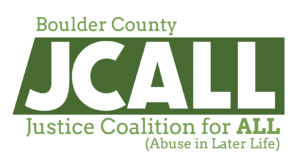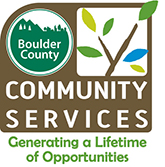 Abuse in later life refers to the mistreatment of older adults. It may involve financial, physical or sexual harm, or neglect by someone who provides care for an older person. The Boulder County Justice Coalition on Abuse in Later Life (JCALL) works to raise awareness, prevent mistreatment, and enhance our community’s responses to abuse in later life.
Abuse in later life refers to the mistreatment of older adults. It may involve financial, physical or sexual harm, or neglect by someone who provides care for an older person. The Boulder County Justice Coalition on Abuse in Later Life (JCALL) works to raise awareness, prevent mistreatment, and enhance our community’s responses to abuse in later life.
Abuse in Later Life
Videos and Resources
The following videos and resource materials provide information on abuse in later life and describe how to get more information and support. Click on a section below the videos to see the resources and phone numbers related to each video.
Abuse in later life can take many forms, and different types of abuse can occur together. Learn more about different types of abuse in later life by clicking the titles below:
Note that this section does not give legal definitions of crimes.
Financial Exploitation
Financial exploitation is the illegal or improper use of an older person’s money, assets, or property. It also means deceiving, harassing, intimidating, or using undue influence to get an older person to do something against their will. It includes:
- stealing, or withdrawing more than an older person agreed to
- forging an older person’s signature on a check or other document
- coercing an older person to sign a document or part with their money, assets, or property when they don’t want to
- routinely threatening to put an older person “in a nursing home” if they don’t hand over money or sign over legal documents like a deed or car title
- misusing a power of attorney or one’s court-appointed role as conservator or guardian of an older person for one’s own personal use, rather than for the benefit of the older person
Neglect
Neglect is the failure by a caregiver of an older person to provide the person with necessities like food, water, shelter, personal hygiene, medical, or comfort needs and other essentials. It also includes a caregiver’s failure to provide these things in a timely manner or with the degree of care that a reasonable person in the same situation would use.
Examples of neglect include a caregiver’s failure to:
- call a medical provider when treatment is needed
- provide needed medications at all, or provide them in a timely manner
- provide adequate food or liquids, or appropriate clothing or hygiene
- ensure that the older person has needed assistive devices like dentures, wheelchair, eyeglasses or hearing aids, or failure to keep these in good repair
- keep an older person’s habitation safe and sanitary, resulting in a hazardous environment
Neglect can also occur where a caregiver knowingly uses harassment, undue influence, or intimidation to create a hostile or fearful environment for an older person.
Who is a Caregiver?
A caregiver is someone who:
- is responsible for the care of an older person as a result of a family or legal relationship, or
- has assumed responsibility for the care of an older person, or
- is paid to provide care or services to an older person
A caregiver can be a family member, a home health provider, a facility staff member, or a neighbor who has agreed to provide recurring assistance to help an older person meet his/her basic needs.
- Doing occasional shopping or cleaning for an older person doesn’t mean that someone has assumed responsibility for an older person’s care.
Physical Abuse
Physical abuse is the infliction of non-accidental physical injury or pain. It also includes unreasonable confinement or restraint of an older person. Some examples of physical abuse are:
- hitting, biting, pinching, slapping, kicking an older person
- roughly handling an older person and causing pain or injury
- leaving an older person alone and tied to a bed or wheelchair for long periods of time for “safety reasons”
- using medication without medical reason to limit an older person’s movement or control their behavior
Sexual Abuse
Sexual abuse means subjecting an older person to unlawful sexual conduct or contact. It can include:
- rape or other criminal sexual assault
- showing an older person sexually explicit images or video without their consent
- touching genitals during care without a medical or hygienic reason
- taking pictures or video of an older person in various stages of undress without their consent
Emotional/Psychological Abuse
Emotional or psychological abuse might accompany other types of abuse, and may involve actions like making threats, bullying, shaming, intimidating, belittling, or controlling an older person, causing significant distress or emotional harm.
Older people might experience financial exploitation, caregiver neglect, or physical or sexual abuse, and these forms of abuse can occur together. Older people can be harmed in any of these ways by spouses, partners, children or other family members, caregivers, or others, including strangers.
Here are some questions to help determine whether someone is harming you:
Does a Spouse, Partner, Family Member, Caregiver, or Anyone Else:
- Try to limit the amount of time you spend with friends and family or on the phone or online?
- Scare you or make you feel fearful?
- Tell you that can never do anything right?
- Yell at you or tell you that you are worthless or no good?
- Make you feel like you need to tip-toe around to prevent an outburst of anger?
- Control your money, or use your money in ways you don’t agree with?
- Make you do things you don’t want to do?
- Threaten to put you in a nursing home if you do not do what they want?
- Touch you or force you to do sexual things you do not want to do?
- Take money or possessions from you without your permission?
- Refuse to provide care or provide care in a way that is hurtful?
- Throw, break, or sell items that are important to you?
- Threaten to harm you in any way, or hit, push, pinch, strangle, or slap you?
Have any family members or friends expressed their concern about you, your relationship with someone else, or that someone else is controlling your money in ways you don’t want?
Are any family members, friends, or neighbors afraid to visit you?
What Can I Do?
If you feel that you’re being harmed or taken advantage of, that someone else is controlling your money in ways you don’t agree with or not providing proper care for you, or that you’re not safe where you live, it’s a good idea to get more information or seek help.
It’s ok to speak up if something doesn’t feel right, whether it’s through a family member, friend, neighbor, or a trusted professional.
Safety is most important. If you are in danger and want law enforcement to respond, call 911 in an emergency, or you can call your local police dispatch — their numbers are on our webpage.
You can call any of the resources on our webpage for more information and support.
Keep in mind that there are specific programs and individuals in Boulder County to listen and work with you confidentially. To talk to someone confidentially in Boulder County 24/7 for support and information in English or Spanish, call:
- Safehouse Progressive Alliance for Nonviolence 303 444-2424
- Safe Shelter of St. Vrain Valley 303 442-7722
Call 911 in an emergency.
Justice Coalition on Abuse in Later Life (JCALL): 303-441-1486
Non-Emergency Law Enforcement
- Boulder: 303-441-3333
- Boulder County Sheriff’s Office (incl. Erie, Louisville, Lyons, Nederland): 303-441-4444
- Lafayette: 303-665-8571
- Longmont: 303-651-8501
24-Hour Confidential Support and Information
- Safehouse Progressive Alliance for Non-Violence (SPAN): 303-444-2424
- Safe Shelter of St. Vrain Valley: 303-772-4422
Support for Sexual Violence
- Moving to End Sexual Assault (MESA): 303-443-7300
Assisted Living and Nursing Home Residents
- Long-Term Care Ombudsman: 303-441-1173
General Services for Older Adults in Boulder County
- Boulder County Area Agency on Aging: 303-441-1617
- Boulder Older Adult Services: 303-441-3148
- Erie Active Adults: 303-926-2795
- Lafayette Senior Center: 303-665-9052
- Longmont Senior Center: 303-651-8411
- Louisville Senior Center: 303-335-4919
“Mandatory reporting” means that certain people, including doctors, nurses, social workers, bankers, caregivers, and many who work with older adults, are required by law to report to police if they suspect or see signs of abuse, financial exploitation, or neglect by a caregiver towards anyone age 70 or older.
Our webpage lists all of the mandatory reporters in Colorado.
In Colorado, our mandatory reporting law is there to help keep older people safe. It simply means that a situation will be looked into to make sure an older person is safe and receiving the proper care and support they need.
A mandatory report doesn’t automatically mean that someone is going to jail, or that an older person will be put in a nursing home or lose their caregiver.
- It’s not about making trouble for anyone; it’s there to help protect older people from harm by making sure that if a professional sees or suspects that someone is harming an older person, whether physically, sexually or financially, or that a caregiver is neglecting an older person in some way, it gets reported and looked into.
- It’s also about getting help for an older person if they need it.
So What Happens?
A mandatory reporter has to call the police, or 911 in an emergency. They need to do so within 24 hours of seeing or suspecting the abuse.
Within 24 hours of receiving the report, the police have to notify Boulder County’s Adult Protective Services and District Attorney’s office of the report.
Any of these agencies might investigate. An investigation could include:
- interviewing the older person, caregivers, witnesses
- reviewing medical or financial records
- conducting a criminal investigation
- referrals to other essential services
These agencies can also take several important steps to make sure that an older person is safe. They can offer a number of vital supports, including:
- arranging for home care, transportation, meals, or other supportive services
- referral to other community resources for ongoing supports such as home health services, financial assistance programs, counseling or therapy, caregiver support, and legal assistance.



